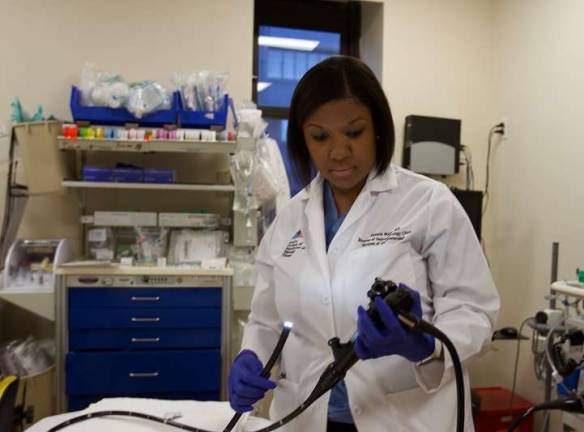screening for colorectal cancer

By Pascale M. White, M.D.
Colorectal cancer is the third most common cancer in the United States and the second leading cause of cancer-related deaths. In 2018, it is estimated that there will be 140,250 new cases of colorectal cancer in the United States. Current guidelines from the U.S. Multi-Society Task Force on Colorectal Cancer and the U.S. Preventive Services Task Force recommends that patients who are at average risk for colorectal cancer should begin screening at 50 years old. The American College of Gastroenterology specifically recommends that African-Americans begin colorectal cancer screening at 45 years old. The New York Citywide Colon Cancer Control Coalition (C5) was launched in 2003 to increase colorectal cancer screening via colonoscopy for all New Yorkers ages 50 and older. The efforts of this group produced an increase in screening colonoscopy rates in New York City from 42 percent in 2003 to almost 70 percent in 2014. Patients should be aware that there are different ways they can get screened, including colonoscopy and now Cologuard.
Colonoscopy ScreeningA colonoscopy is a procedure where an endoscope (flexible tube with an attached camera) is used to identify polyps in the colon. Polyps are abnormal tissue growths from the lining of the colon. Prior to the procedure, a patient is instructed to follow a special diet and drink a liquid laxative preparation that cleanses the colon. During the procedure, the gastroenterologist uses the endoscope to look carefully throughout the colon to find and remove polyps. After the procedure, the polyps are sent to the pathology lab where they will be identified as either benign or precancerous. Depending on the number and type of polyps that are removed, the gastroenterologist will recommend the time interval of your next colonoscopy.
An advantage of having a colonoscopy is that if no polyps are found, the exam can be repeated in 10 years. If there is a lesion that appears suspicious during the procedure, it can be biopsied at that time and sent for evaluation as well. Another important advantage is that having a colonoscopy is both diagnostic and therapeutic, meaning that polyps can be detected and removed to prevent cancer. A disadvantage to having a colonoscopy is the risks associated with undergoing an invasive procedure. Certain barriers for some patients may include time away from work or the home, aversion to the bowel prep, and the need to have an escort home after the procedure.
Cologuard Screening Cologuard is a multitarget stool test that identifies abnormal DNA and human hemoglobin (blood) in the stool. A Cologuard kit is mailed to the patient’s home and they follow the directions to collect their stool sample. Once the kit is ready to be submitted, the patient will arrange for it to be picked up at their home where it will be mailed to a laboratory for evaluation. Advantages of this screening modality are that it is a non-invasive test, no laxative preparation is necessary, no special diets are required prior to collecting the stool sample, there is no time away from work or home, and there is no need to arrange for an escort or transportation. A disadvantage of Cologuard may be the cost of the test because certain insurance companies may not cover it. If there is a negative result, the Cologuard test can be repeated in three years. However, if the Cologuard test returns positive, the patient will then have to take the next step and undergo a colonoscopy for further evaluation. Cologuard is only recommended for asymptomatic, average-risk patients who are 50 years of age and older. Patients who are having gastrointestinal symptoms (including abdominal pain and blood in the stool) or who have a personal history of colon polyps should not be screened with Cologuard.
Overall, patients should be aware that colorectal cancer could be detected and prevented with appropriate and timely screening. While there are different ways of getting screened, the best test is the one that a patient commits to getting done.
Pascale M. White, MD is an Assistant Professor of Medicine and Director of the GI Fellows Clinic at The Dr. Henry D. Janowitz Division of Gastroenterology, Icahn School of Medicine at Mount Sinai.